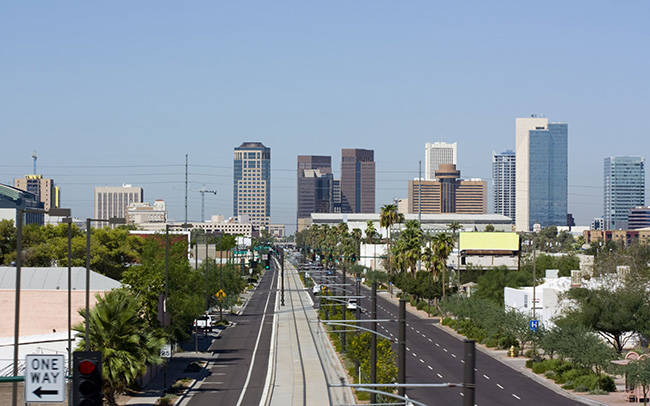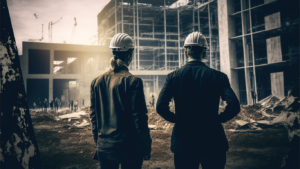Valley Partnership’s mission is advocating responsible development. The advocacy group represents the commercial, industrial and masterplanned real estate development industry by presenting a balanced, pro-development perspective and the Valley’s best industry education and networking opportunities.
But what should be the 25- or 30-year vision for Valley Partnership? What role do Valley Partnership’s leaders think the real estate development industry will play or should play in the long-term economic health of the Valley and state? AZRE talked with some of Valley Patnership’s most influential leaders to get their take on where commercial real estate development is, where it’s going and what needs to happen to enhance and grow the industry.
AZRE: What role will the real estate development industry play in the long-term economic health of the Valley and state?
Molly Carson, vice president of development, SouthWest Region, Ryan Companies: It will continue to play a significant role. What those of us in the industry need to do is make sure it is a positive one. Smart development benefits the economic health of communities. Conversely, poorly planned development, or overdeveloping can be devastating to communities. It is the responsibility of CRE to put the best interest (of the community) in the forefront when making these decisions. We are fortunate to have Valley Partnership, an organization with the focus of responsible development, in our state. Their impact has been great through its 26 years of existence and I expect that to continue.
Heidi Kimball, senior vice president, Sunbelt Holdings: Thanks to the work of a lot of visionaries and leaders within our community, the Valley’s economy is becoming more diverse and less dependent upon growth. The development community contributes to that growing diversity by being responsive to the need for environments that attract these new high-tech industries, employers, and employees. The commercial development industry, in conjunction with municipalities and entrepreneurial institutions like ASU are creating truly transformative places to work, create and produce, and are even teaming together to provide infrastructure solutions. Home builders have responded ingeniously to changing demographics and demand for a variety of housing types, which also serves to make Phoenix a more interesting place to live and attracts a highly mobile educated workforce. This collaboration is what will fuel the economy for the Valley in the long term.
“We also need to focus on diversifying our economy to ensure that the real estate market stays strong, regardless of construction industry ups and downs.” Tempe Mayor Mark Mitchell
Jay Kramer, director, Fennemore Craig: Real estate development is one of the key economic drivers of our economy. Real estate developers, their lenders and equity partners do not generally subscribe to the “build it and they will come” mentality. Real estate development is ultimately a result of job growth and in-migration. In order for the real estate development industry to flourish, our economy needs to continue to grow and diversify so that we can better withstand the vagaries of the real estate cycles.
Darin Mellott, director of research and analysis, Southwest Region, CBRE: Ultimately, real estate exists to serve a purpose in the economy. Although real estate itself can contribute to economic health, it should be more of a reflection than a driver. As such, it is the industry’s responsibility to respond to the needs of the community as a whole. This means real estate decisions need to take into account broader impacts and ensure that there is an appropriate supply of what the economy needs to continue growing and evolving. Furthermore, because real estate assets are long lasting, the industry should always have an eye on both the short term and long term. Lastly, because the fate of property markets is so broadly and deeply connected to the economy, the real estate community needs to remain engaged on the local, state and federal levels to ensure that growth is both high quality and sustainable through good policy.
Mark Mitchell, mayor, City of Tempe: You cannot have a healthy local economy without a healthy real estate industry, in all economic sectors. But we also need to focus on diversifying our economy to ensure that the real estate market stays strong, regardless of construction industry ups and downs. An innovation economy will better weather any downturns. Tempe and the other cities in our region are building an innovative and diversified economy that should fuel real estate development as companies start, grow and thrive here in our communities.

Bryce Lloyd, president, Phoenix Metro, FirstBank: This is a primary objective of Valley Partnership: to ensure we have responsible development that supports a thriving economy. As our economy continues to expand and diversify, the real estate development industry will be there to support this with the necessary housing, office, industrial, medical and retail improvements. Responsible development will ensure we have the desirable and sustainable communities that we and future generations will demand.
Derek L. Sorenson, partner, Quarles & Brady LLP: The real estate development industry will continue to play a pivotal role in the economic health of the Valley and state. Aside from providing jobs and other economic opportunities across a wide array of industries and professions, real estate development touches nearly every element of our quality of life: where and how we live, where we work, where we shop, what we do for fun and what we offer to attract new businesses and new residents.
AZRE: Some experts are theorizing we’re headed for another recession — agree or disagree and why?
Carson: Some form of recession is inevitable, that is the cycle of business. The level of recession is the million dollar question. Since the growth over the past several years has been slower and steadier, and much more diverse (not relying solely on home building) (than previous recoveries), I believe the next recession will be a dip, rather than a steep drop.
Kramer: In the short term, I disagree. We are likely to continue to see slower and more consistent, sustainable growth throughout Arizona. For the long-term health of our market, this is a better model than the hockey stick boom and bust that we previously experienced. When (and not if) the next recession occurs, hopefully, we will be better positioned to withstand the effects and rebound more quickly.
Mitchell: It has been said, “Economists have accurately predicted 11 of the past six recessions.” What I mean by this is, well, we don’t know — but we must be prepared. I am optimistic that our economy will stay strong, but it’s my job, and the job of all policy-makers to maintain and enact responsible policies at all levels that will build on the momentum we have now and weather the cyclical ups and downs of the economy. Those responsible policies must be both short and long term in thinking. For example we must support our local businesses, adequately fund education, and ensure cities have the ability to innovate and attract jobs.
Lloyd: I do not believe we are facing the prospect of a severe recession in the near term, at least not of the severity of the most recent one. Arizona, like all other states, is subject to national and global events, which are out of our control. Our recovery from 2008 has been bumpy, and certainly not as robust as other areas in the western U.S. As a result of this fairly sluggish recovery, I do not think we are facing a significant real estate decline in the near future. Due to the cyclical nature of any capitalist economy, we will see future recessions. I think the continued diversification of the local economy will assist in leveling out our peaks and valleys.
Mellott: CBRE’s expectation is that there will be moderate economic growth in 2016 (around 2 percent in the US), low inflation and low interest rates, but occasional bouts of pessimism. This outlook is underpinned by an improving and relatively good outlook for the consumer. The combination of low commodity prices, low interest rates, falling unemployment and rising home prices adds up to a reasonably good outlook for consumers. A similar dynamic is in play in Europe as well, and China’s economy is stabilizing as it responds to policy adjustments. In short, CBRE’s expectation is that 2016 will be a good year — albeit not uniformly — across the U.S. and globe and in many respects, even better in Phoenix.
Sorenson: I disagree that another recession is around the corner. The real estate industry in the Valley is so diverse. Certain areas of the real estate economy (shopping centers, for example) have been slow to recover, but others have thrived and are continuing to thrive. Unless a recession hits the country as a whole, I believe the outlook is good for Valley real estate development.

AZRE: What do you feel should be the 25- to 30-year vision for Valley Partnership going forward?
Carson: Onward and upward. To attract, retain and grow as many successful corporate headquarters as we can. Doing this by continuing to spread the wonderful assets and attributes Arizona has to offer. In tandem with the goal/vision of becoming one of the Top 10 states in the country from a K-12 education standpoint.
Kramer: There will be so many changes throughout Arizona during the next 25 to 30 years, which makes it difficult almost impossible to have such a long-term vision. During the next five years, I want to see Valley Partnership continue to grow into the “go to” organization for responsible development that can coalesce the real estate and business community on the most pressing issues affecting Arizona, including water, transportation, infrastructure, high-paying job creation and education.
Mellott: Valley Partnership should be a vehicle to promote not just a healthy environment for real estate development, but should also look at the overall health of the Valley’s economy, because without one you can’t have the other. Issues in the community at large will affect the health of property markets. The global economy and landscape that the Phoenix metro is a part of will continue to evolve amid fierce competition. Success in communities is not an accident and a strong public-private partnership is almost always a defining feature of those successes. With this in mind, the real estate community should actively be involved in supporting and shaping an agenda that will allow the Phoenix economy to grow in a sustainable and balanced manner and create positive outcomes for all residents of the Valley.
Mitchell: Valley Partnership should remain true to its core mission: to advocate for responsible development. An effective way to do that is for Valley Partnership to help businesses and government work together to achieve our common goals. A big part of that is honest communication. We need businesses and their organizations to feel comfortable sharing with our state and local governments how important things like a strong and well-funded K-12 and higher education system are to both the short and long term economic gain.
Lloyd: Valley Partnership will continue to advocate for a balanced, healthy, and sustainable development perspective. Arizona and the Phoenix area will continue to have growth due to its desirable lifestyle and business climate. Valley Partnership and its members will be an integral player in the next 25 to 30 years.
AZRE: How does the CRE industry establish a consistent administration of taxes, fees and regulations across all jurisdictions?
Carson: By working together. Smart, reasonable, collaborative minds can do great things when they focus on a universal goal. The Real Estate industry is in a good position to lead this effort.
Kimball: Valley Partnership can assist the development and real estate community to assure this consistency by serving as the convener for other industry groups, and wielding our collective influence across administrations. We can do this most effectively by being a partner in the jurisdictions we engage with, rather than an adversary. That has always been one of our greatest strengths, and the reason that public bodies seek our input and collaboration.
Kramer: Your question presupposes that consistent administration of taxes, fees and regulations across all jurisdictions is a worthy goal. I am not sure that I agree. There are areas of state-wide or regional importance where state law needs to supplant local control, such as water regulation, environmental protection and personal property rights. There are enough differences from community to community and the wants and needs of different locales, that local decision-making and control are necessary in other areas, including zoning and land use and local taxes.
Lloyd: The CRE industry will help establish a consistent administration of taxes, fees and regulations across all jurisdictions by working with all government partners to ensure consistency in the imposition and use of development fees; engage in policies that impact the vitality of the development industry; support sensible standards and offer a wide-range of creative options to meet those standards. Valley Partnership is the one locally based real estate organization uniquely positioned to bring all the stakeholders together to ensure all of these things.
Mitchell: One thing to keep in mind is each jurisdiction in the Valley is different in their life cycle. Tempe is one, if not the only, built-out communities in the state and our challenges and opportunities are different than other communities that still have large amounts of developable land. Even considering redevelopment, Tempe’s redevelopment challenges are different than those of our neighbors given our geography. There does need to be a level of standardization across all jurisdictions, but there also needs to be flexibility so each community can address its unique needs.




